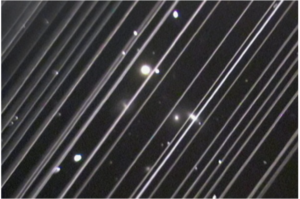Satellite Streak Watcher Project
Victoria Girgis/Lowell Observatory (image source)
NASA wants you to photograph Starlink satellites with your smartphone – article in Astronomy magazine highlights changes in the night sky caused by low-Earth orbit satellites being launched – eventually in the thousands – to facilitate internet connectivity.
As the article notes, astronomers have been fighting the steadily increasing problem of light pollution from sources on the ground for years. Now they have to contend with the reflective surfaces of satellites showing up as streaks of light in the night sky. These reflective streaks disrupt astronomers’ ability to photograph and study the night sky.
And now educators at NASA have launched a project that asks for the public’s help documenting these satellite streaks as part of a long-term effort to study how the technology will change our night sky. Anyone with a modern smartphone and a tripod can contribute to the Satellite Streak Watcher project.
Why should we care? The International Astronomical Union lists many of the ways we benefit from studying the sky above us and the vastness of space beyond. Check out photos at NASA’s Astronomy Picture of the Day to stretch your mind, stimulate the imagination, maintain perspective, and simply marvel at the beauty and wonder of the universe.
“Before we invented civilization our ancestors lived mainly in the open out under the sky. Before we devised artificial lights and atmospheric pollution and modern forms of nocturnal entertainment we watched the stars. There were practical calendar reasons of course but there was more to it than that. Even today the most jaded city dweller can be unexpectedly moved upon encountering a clear night sky studded with thousands of twinkling stars. When it happens to me after all these years it still takes my breath away.”
― Pale Blue Dot: A Vision of the Human Future in Space (quote found here)
Update, additional sources:
The Human Environment Includes Orbital Space (March 10, 2020; International Dark Sky Association)
Globe at Night 2020 (International Dark Sky Association)
Global Astronomy Month 2020 (organized every April by Astronomers Without Borders)
Can Designers Combat Light Pollution by Embracing Darkness? (May 2, 2018; Metropolis)
Light Pollution and the Night Sky (Dec 6, 2016; Architectural Lighting)

